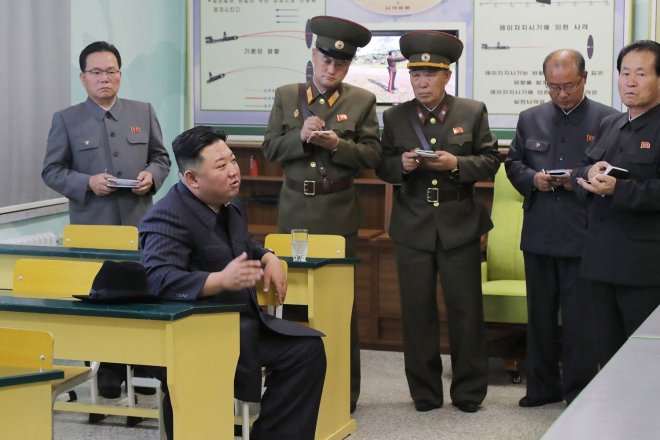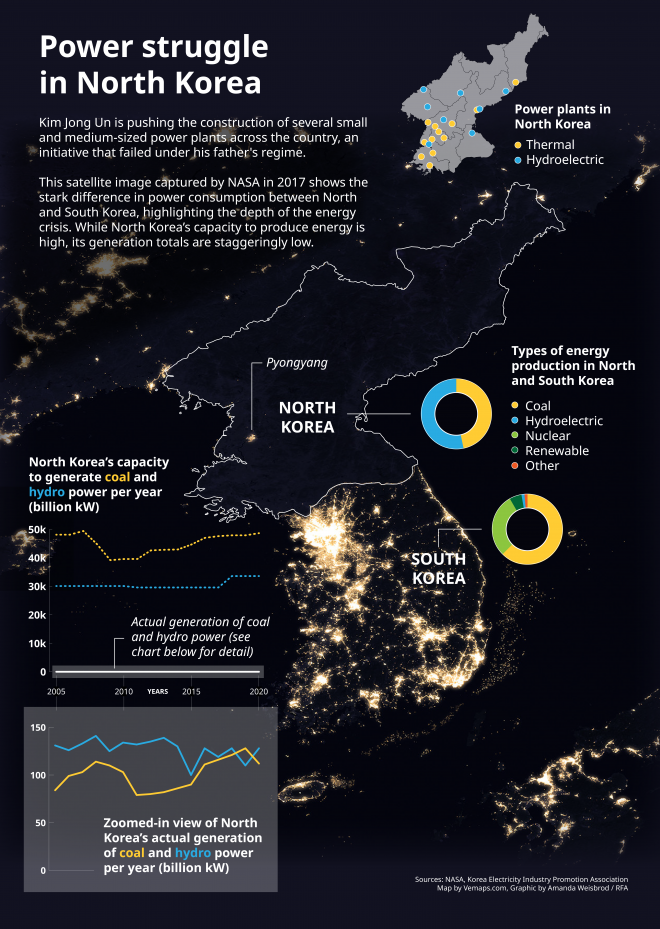
North Korea’s central government is ordering provincial cities to solve their own power shortages by building small and medium-sized hydropower plants, echoing a policy from the era of former leader Kim Jong Il, sources have told Radio Free Asia.
But few of the plants built during that time are still in operation, and few local officials want to tackle such projects, knowing they will have to gather the materials and find construction labor themselves, the sources said.
Communist North Korea is chronically short on power, and rolling blackouts are common, even for privileged people in the capital, Pyongyang.
In 2018, North Korea’s power generation capacity was one-twenty-third that of the more prosperous and democratic South Korea, according to data from Statistics Korea, a South Korean government agency.
North Korea’s aging power plants, lack of energy resources and its inefficient transmission and distribution systems are key contributors to chronic power shortages.
The central government under current leader Kim Jong Un is once again falling back on the country’s founding “Juche” philosophy of self-reliance, by telling the local governments to fix their own problems.
“They say this and that about regional development and self-reliance … but the pressure to build a power plant is a task that is deeply agonizing to officials,” a company official in the northeastern coastal city of Chongjin told RFA’s Korean Service on condition of anonymity for security reasons.
“At every meeting, the provincial authorities are forcing large organizations to submit power plant design plans, and they say that they will guarantee the necessary construction materials,” he said.
But the officials know that they will have to acquire the heavy equipment, cement, rebar, and other materials, then they will have to find the necessary manpower themselves, he said.
As many of Chongjin’s state-run companies and organizations are reeling from the economic downturn that coincided with the coronavirus pandemic, few are in any position to build a costly, labor-intensive project like a power plant.
“No organization in Chongjin has stepped forward to build a power plant,” he said.
The source said that many of the power plants built in and around Chongjin shortly after the 1994-1998 famine, during the rule of Kim Jong Il, are no longer in use. Either the water dried out from under them due to poor river management, or flooding washed away their embankments. Many others that should still be in operation, meanwhile, have fallen into disrepair due to age and wear.
Companies and organizations in Chongjin built several plants at that time, but only one of these is still producing electricity.
“Despite the fact that the nationwide power plant construction project of the Kim Jong Il era has failed, the authorities are again promoting this ineffective policy, and advocating we make a ‘head-on breakthrough’ through ‘self-reliance,’” he said.

The central government’s orders are making officials and residents in the eastern coastal city of Tanchon nervous, said a resident there, who requested anonymity to speak freely.
“Officials fear the term ‘self-reliance,’ which basically means they have to fix everything on their own, and the people are worried they will be mobilized every day to build the power plant,” he said.
“Mobilization” is the militaristic term authorities use to justify ordering citizens to provide free labor for government projects.
“Even now, Tanchon residents are providing manpower to build the Tanchon power plant, which began construction in 2017,” he said
Once they begin building more power plants, they will again have to sacrifice to see them to completion, according to the second source.
“They have to pay support funds and donate construction materials such as gravel, stones, and cement. It is powerless ordinary residents who eventually suffer,” he said.
Just as in Chongjin, local organizations built several power plants in Tanchon and its surrounding province of South Hamgyong when Kim Jong Il was in power, but few are producing electricity anymore.
“With Kim Jong Il’s words to build small and medium-sized power plants ‘wherever water flows’ to solve the electricity problem, many people here have suffered for the past few decades,” the source said. “Now that Kim Jong Un is implementing the same policy, we are suffering again.”
Translated by Leejin J. Chung. Written in English by Eugene Whong.
